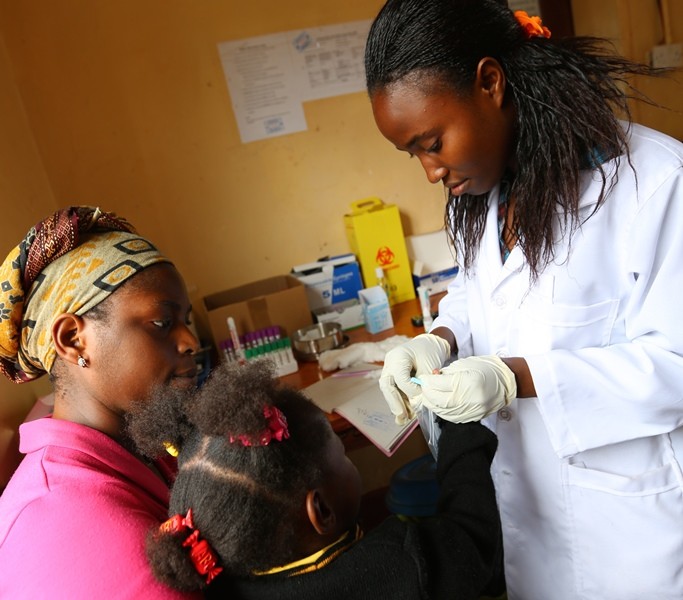
USAID assistance to Zambia focuses on the following six key areas: (1) improving the health of Zambians, with a particular focus on women, at-risk youth, and vulnerable children; (2) reducing the incidence and impact of HIV/AIDS, malaria, and other illnesses; (3) increasing agriculture-led economic growth to reduce rural poverty and food insecurity; (4) mitigating the effects of climate vulnerability and promoting sustainable management of natural resources; (5) raising the quality of basic education to increase literacy; and (6) enhancing democratic governance.
Health
USAID supports Zambia in strengthening its public health system at the national, provincial, and community levels. With an HIV prevalence of almost 12 percent, Zambia benefits from USAID’s assistance, through the United States President’s Emergency Plan for AIDS Relief (PEPFAR), to scale-up integrated prevention, care, and treatment programs and lessen the impact of HIV/AIDS. In collaboration with the Zambian Ministry of Health, USAID’s activities also work on increasing the quality of health care, the prevention and treatment of other diseases such as malaria, and tuberculosis, and on changing attitudes and behavior with regard to maternal and child health, nutrition, family planning, and gender-based violence. To ensure widespread access to health products and services, USAID also procures and supports commodity management for essential medical supplies.
Economic Development, Environment, and Food Security
In Zambia, through the Feed the Future initiative, USAID tackles rural poverty and malnutrition with activities that address policy issues, promote access to markets, and assist smallholder farmers to diversify and increase agricultural production and incomes. Zambia also has a tremendous wealth of natural resources which, however, face increasing threats, including deforestation, illegal and unsustainable wildlife trafficking, and the effects of extreme weather conditions. USAID encourages sustainable natural resource management to conserve Zambia’s forests and wildlife, and supports measures to combat wildlife trafficking. Through the Power Africa initiative, USAID seeks to increase generation of, and access to, clean energy sources, especially in remote rural and off-grid spaces.
Education
Zambia has made significant gains in increasing access to education, but continues to be plagued by poor education quality and low progression rates. USAID collaborates with the Zambian Government and other implementing and cooperating partners to improve the quality of basic education, as measured by learner performance in early-grade reading. USAID/Zambia programs in education aim to strengthen the capacity of teachers, school administrators and officials to deliver education services, and provide improved teaching and learning materials.
Democracy, Human Rights, and Governance
With a long history of democratic governance and peaceful transitions of power, Zambia has a strong foundation on which to build accountable and responsive systems of governance that steadily advance the nation’s development priorities. Recent trends reveal threats to this opportunity. The run-up to the 2016 general elections was marred by violence and the government’s selective use of laws and police to limit the ability of the opposition to mobilize and campaign. A contested result entrenched political divisions, and raised concerns about judicial independence from the executive. USAID’s support for a more accountable and responsive government and a more inclusive political system will increase citizen commitment to democratic governance.








Comment
Make a general inquiry or suggest an improvement.